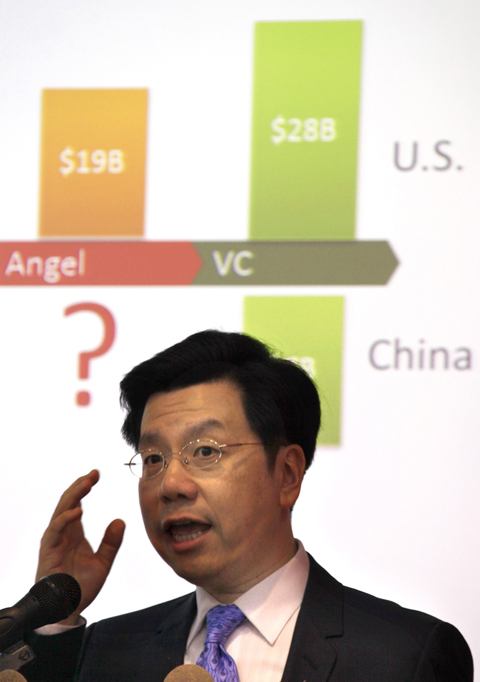China’s mobile Internet users may more than double within five years as smartphones that can browse the Web and download music become more affordable, said Lee Kai-fu (李開復), the former head of Google Inc’s China division.
The number of people accessing the Internet on their mobile devices in China may grow to 800 million within three to five years, from about 300 million now, Lee said in an interview yesterday at the Beijing headquarters of Innovation Works (創新工廠), the technology business incubator he set up after leaving Google.
Lee’s company is investing in a mobile-software maker and 11 other businesses in the country to benefit from booming demand for Web technology.

PHOTO: REUTERS
Lenovo Group Ltd (聯想), the nation’s biggest maker of personal computers, expects products aimed at the mobile Internet market may comprise as much as 20 percent of the company’s sales in five years, president Rory Read said in April.
“It’s beginning to really take off,” Lee, 48, said of the nation’s mobile Internet market. “Everyone is starting out, figuring out how things will go. That’s exactly the right time when we want to get engaged.”
As 83 percent of mobile Internet users in China are aged about 29 years or younger, they don’t have a lot of money and are very sensitive to handset prices, Lee said.
Smartphones must be priced lower than 2,000 yuan (US$295), or less than half the current cost of more than 4,000 yuan, to be affordable, he said.
The price of a smartphone running Google’s Android system is likely to drop to about 1,500 yuan this year and 750 yuan next year, making such devices affordable to more people, Lee said.
Innovation Works raised US$115 million to invest in startups firms, and eight of the 12 firms the company has funded so far are in the mobile Internet business, he said.
Innovation Works, which received funding from WI Harper Group and Foxconn International Holdings Ltd (富士康), invests between US$15,000 and US$2.5 million in new businesses and supports them by providing access to technology-industry expertise, Lee said.

MORE VISITORS: The Tourism Administration said that it is seeing positive prospects in its efforts to expand the tourism market in North America and Europe Taiwan has been ranked as the cheapest place in the world to travel to this year, based on a list recommended by NerdWallet. The San Francisco-based personal finance company said that Taiwan topped the list of 16 nations it chose for budget travelers because US tourists do not need visas and travelers can easily have a good meal for less than US$10. A bus ride in Taipei costs just under US$0.50, while subway rides start at US$0.60, the firm said, adding that public transportation in Taiwan is easy to navigate. The firm also called Taiwan a “food lover’s paradise,” citing inexpensive breakfast stalls

TRADE: A mandatory declaration of origin for manufactured goods bound for the US is to take effect on May 7 to block China from exploiting Taiwan’s trade channels All products manufactured in Taiwan and exported to the US must include a signed declaration of origin starting on May 7, the Bureau of Foreign Trade announced yesterday. US President Donald Trump on April 2 imposed a 32 percent tariff on imports from Taiwan, but one week later announced a 90-day pause on its implementation. However, a universal 10 percent tariff was immediately applied to most imports from around the world. On April 12, the Trump administration further exempted computers, smartphones and semiconductors from the new tariffs. In response, President William Lai’s (賴清德) administration has introduced a series of countermeasures to support affected

CROSS-STRAIT: The vast majority of Taiwanese support maintaining the ‘status quo,’ while concern is rising about Beijing’s influence operations More than eight out of 10 Taiwanese reject Beijing’s “one country, two systems” framework for cross-strait relations, according to a survey released by the Mainland Affairs Council (MAC) on Thursday. The MAC’s latest quarterly survey found that 84.4 percent of respondents opposed Beijing’s “one country, two systems” formula for handling cross-strait relations — a figure consistent with past polling. Over the past three years, opposition to the framework has remained high, ranging from a low of 83.6 percent in April 2023 to a peak of 89.6 percent in April last year. In the most recent poll, 82.5 percent also rejected China’s

PLUGGING HOLES: The amendments would bring the legislation in line with systems found in other countries such as Japan and the US, Legislator Chen Kuan-ting said Democratic Progressive Party (DPP) Legislator Chen Kuan-ting (陳冠廷) has proposed amending national security legislation amid a spate of espionage cases. Potential gaps in security vetting procedures for personnel with access to sensitive information prompted him to propose the amendments, which would introduce changes to Article 14 of the Classified National Security Information Protection Act (國家機密保護法), Chen said yesterday. The proposal, which aims to enhance interagency vetting procedures and reduce the risk of classified information leaks, would establish a comprehensive security clearance system in Taiwan, he said. The amendment would require character and loyalty checks for civil servants and intelligence personnel prior to